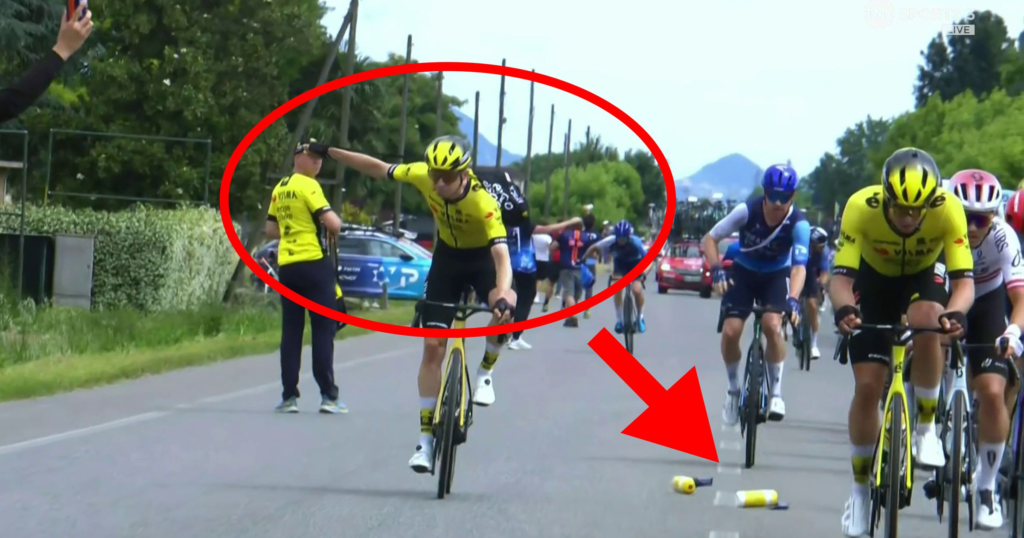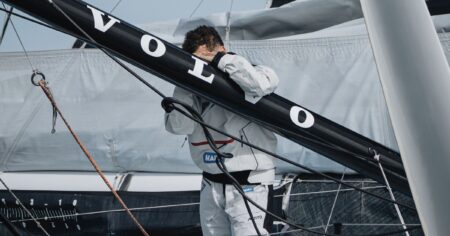On Stage 13 of the highly anticipated 2025 Giro d’Italia, a frightening moment occurred that could have easily turned disastrous for the riders involved. This incident revolved around a rogue feed bag, which unexpectedly found itself in a precarious position, leading to an alarming situation on the course. The occurrence highlights the inherent risks faced by professional cyclists during high-intensity races like the Giro d’Italia, where even minor incidents can have significant consequences.
The drama unfolded when Bart Lemmen, a rider for the Visma-Lease a Bike team, attempted to grab a musette—a type of feed bag—from a roadside helper. In a race where every second counts and athletes are pushing their limits, retrieving a musette is a crucial part of a rider’s strategy to stay fueled and hydrated. However, in this instance, the attempt took a dangerous turn. As Lemmen reached for the bag, it seemed to split upon making contact with his back wheel, resulting in bottles and other contents scattering across the road. Such a scenario is not only chaotic but poses a serious risk to both the rider himself and other competitors on the course.
Commentary from cycling experts during the incident provided further context regarding the perilous situation. Famous commentator and former cyclist Robbie McEwen remarked, “That can be really dangerous. He’s dodged a bullet there!” His remarks underscored the unpredictability of racing dynamics and how quickly an accident can transpire. Fellow commentator Matthew Stephens added insightful commentary regarding the nuances of retrieving feed bags. He noted, “He’s got his musette, caught it really high up,” and elaborated on common practices, explaining that many teams strategically tie these musettes in such a way that allows riders to grab it lower down, which can help prevent mishaps. Given that the riders often navigate these challenges while racing at speeds nearing 45 kilometers per hour, the situation becomes even more precarious.
Fortunately, the incident did not result in any collisions or significant accidents, as the other riders successfully maneuvered around the debris on the road and continued racing without complication. McEwen provided further clarification on the nature of the feed bag itself, noting, “The strap broke off as he took it,” and pointing out that the musette in question contained a substantial weight, with “two full bidons plus a bit of other stuff in it.” This heavy load likely compounded the difficulty of securing the bag safely, proving just how crucial proper technique and communication are during these high-speed exchanges.
Typically, a musette, also referred to as a feed bag, serves as a lightweight shoulder bag designed to carry food and drink essentials for cyclists during races. The contents of these bags can vary widely, but they usually include items like energy gels, fruits, and water bottles—everything a rider needs to maintain their stamina and focus as they conquer steep climbs, sharp turns, and relentless competition.
In the aftermath of the accident, Stephens humorously concluded that the contents of the bag were now “all over the floor,” which might lead to some opportunistic fans or spectators collecting the fallen items as souvenirs later on. This notion offered a lighter perspective on a potentially hazardous situation, reminding us of the unpredictable moments that often shape the narrative of competitive cycling.
Fans following the 2025 cycling season can continue to view thrilling events like the Giro d’Italia, as well as other major tours such as the Tour de France and Vuelta a Espana, through networks like TNT Sports and streaming services such as discovery+. This accessibility allows cycling enthusiasts to capture the drama and excitement that unfolds, requiring not just athleticism but also acute awareness and teamwork among the competitors.












